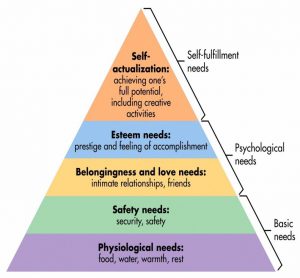The motivation for setting the Lagos Food Bank is in two prongs:
- Personal Experience of the founder
- The increase in number of hungry people in Nigeria
Personal Motivation
For Michael Sunbola, President and CEO of the Lagos Food Bank Initiative (LFBI), that mission is deeply personal. Growing up in Lagos, Michael and his family experienced food insecurity firsthand. He remembers the lengths he and his siblings would go in order to afford a meal: carrying planks of wood from the local sawmill and foraging fruits that had fallen from trees. There were even times when Michael would sell his blood to the local blood bank. “It was such an unpleasant experience,” he says of that time.
“This has been my drive, to be at the forefront of helping the most vulnerable families put food on the table, because I know what it feels like to not have that.”
Today, Michael is a food systems activist, lawyer, and Managing Partner in his own legal firm. Driven by his personal passion and experience, Michael invested much of his law firm savings into the 2015 opening of LFBI. The food bank is Nigeria’s first, and serves clients in communities across Lagos State, its main city with which it shares a name.
Statistics Motivation
After years of decline, the number of people affected by hunger, malnutrition and poverty continues to rise. An estimated 821 million people struggle with chronic hunger. That is 46 million more people went to bed hungry each night in 2023 than the previous year, despite the adoption of the sustainable development goals to end hunger by 2030.Multi-dimensional poverty and hunger are intertwined. Multi-dimensional Poverty is particularly significant in Sub-Saharan Africa. According to the Multidimensional Poverty Index (MPI) published by the United Nations Development Programme (UNDP) and the Oxford Poverty and Human Development Initiative (OPHI), Nigeria tops the list of countries in Sub-Saharan Africa with most people living in multi-dimensional poverty.
It is a known fact that chronic hunger itself is a deep form of multi-dimensional poverty and hunger is not often a food problem. Malnutrition, which causes irreversible damage is a major outcome of poverty plus inequality, it leads to obvious hunger, stunting and wasting.
More commitment is needed to end hunger and malnutrition as sustainable development itself cannot be achieved if there are so many hungry and malnourished people in the world. Economic growth and positive socio-economy are yet to translate to benefits to many people living in Sub-Saharan Africa with reference to Nigeria. There is persistent poverty and hunger with a huge number of Nigerians battling hidden poverty.
Maslow, in his hierarchy of needs categorizes the need for food as a basic physiological need, that is very critical or crucial to human existence. A hungry man or woman, for instance, cannot think of entrepreneurship or education, national development until that basic need is met. The diagram below therefore shows the need for food appearing at the bottom of the pyramid.

At The Lagos Food Bank Initiative, we strongly believe Food is essential to human existence. We are determined to create conditions that will allow people to thrive, systems that seek to alleviate hunger and combat aspects of multi-dimensional poverty by delivering food, basic health services, and disaster relief items. We are actively involved in the Zero Hunger Challenge (ZHC) by aiming to end malnutrition in all its forms within Lagos and its environs. We continue to champion adequate health care by offering interventions and initiatives that empower the vulnerable. We believe that giving back is important no matter how small because no one should go to bed hungry and everyone deserves the right to good health. We offer grass root responses tailored to local hunger needs.
We are set to partner with religious organizations, corporate entities and communities to open new food banks nationwide. Our goal is committed to ensuring that every Local Government in Nigeria has a food bank.
WE ARE OPTIMISTIC

We are not unmindful of the fact that the problems we seek to solve are complex and demand the coordination and focus of many stakeholders – leaders, governments, corporate entities, communities, and individuals around in our Nation. Achieving our goal may be challenging, but we know we can get there.
We obviously cannot achieve it alone, but together we can work for a hunger-free Nigeria. If the food banking system can work successfully in other climes, especially the United State of America, United Kingdom etc; we are very optimistic that our advocacy to spread food banks across Lagos and Nigeria will become a reality.